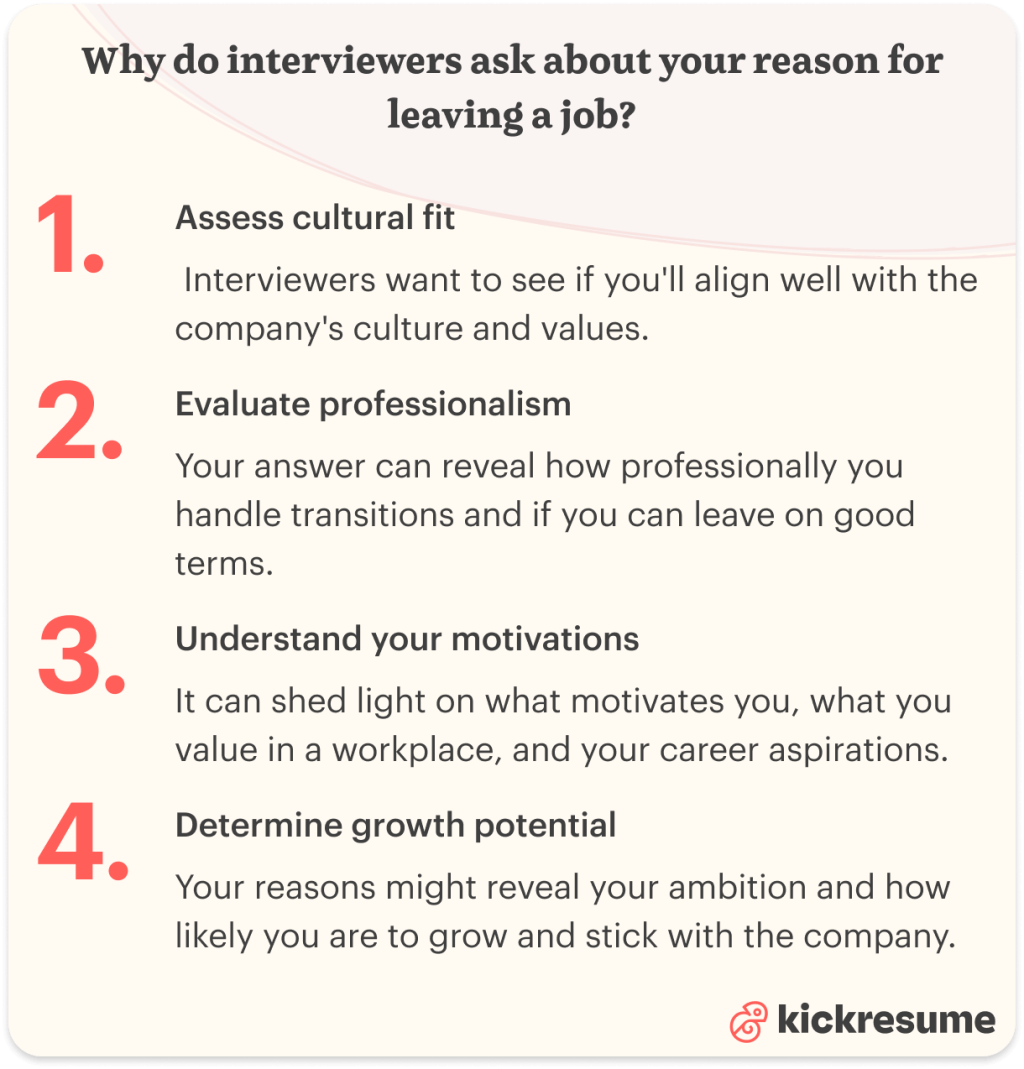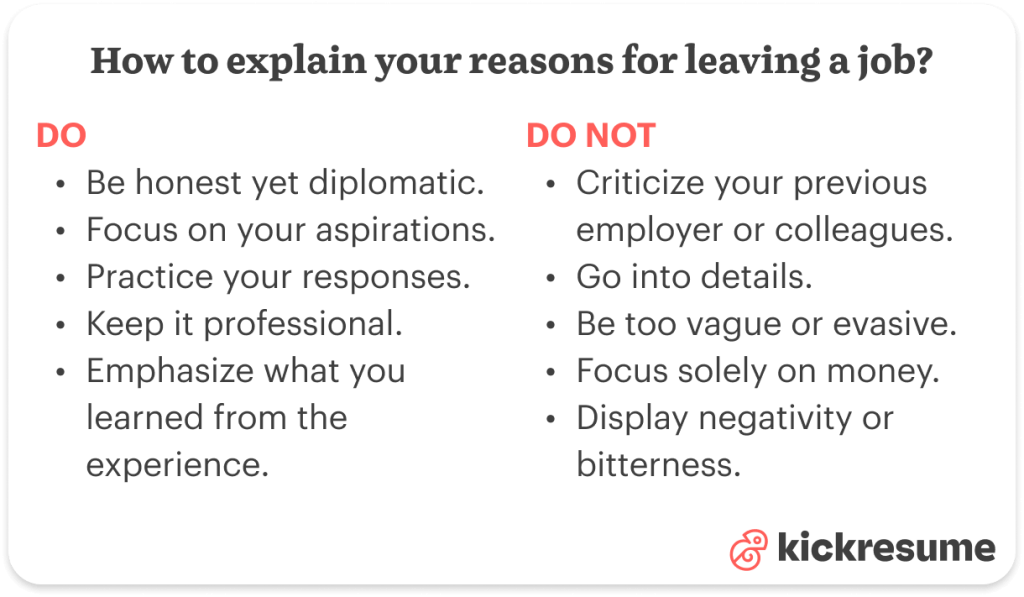Have you ever been thrown off by the "What was your reason for leaving a job" in a job interview? It’s a question that might seem simple, but it often leaves even the most seasoned professionals feeling slightly uneasy.
However, your reason for leaving a job is more than just a routine part of the interview process.
It is, in fact, an opportunity for you to showcase your career growth, professional aspirations, and even your problem-solving skills. How you articulate this can have a significant impact on the interviewer’s perception of you as a potential candidate.
The job interview question is not just about understanding why you decided to move on from a past role. It is also a glimpse into your values, your relationship with past employers and colleagues, and your ability to handle change and adversity.
So, let’s peel back the layers of this question and help you prepare a response that is both authentic and strategically framed. After all, this could be your key to unlocking your next big career opportunity.
Why the “reason for leaving a job” question matters
Interviewers ask about your reason for leaving a job for several key reasons. Understanding these can help you frame your response effectively.
Why do interviewers ask about your reason for leaving a job?
It should go without saying that interviewers do not ask this question out of sheer curiosity. They ask it so they can make a more informed decision whether they should hire you or not.
- Gauge your professionalism: Your response can reveal a lot about your professionalism. It can highlight how you handle tricky situations, and whether you’re able to maintain respect for previous employers even if circumstances weren’t ideal.
- Understand your career trajectory: This question allows interviewers to understand your career progression and the decisions you’ve made along the way.
- Assess cultural fit: Your reasons for leaving can provide insights into what kind of work environment or culture you thrive in, which can be vital to assess the cultural fit.
What are they hoping to learn from your answer?
When they ask you about your reasons for leaving a job, interviewers will always read between the lines of your answer.
- Career goals and aspirations: Your answer can shed light on what you’re looking for in your next job and future career trajectory.
- Conflict management skills: If you left due to conflicts, how you describe the situation can indicate how you handle workplace conflicts.
- Resilience and adaptability: If you left due to company changes or job difficulties, your answer might demonstrate your ability to adapt and overcome challenges.
How could your answer impact their decision?
Just like with any other interview question, the way you explain your reasons for leaving a past job will impact the final outcome.
- Indication of potential red flags: Negative or unclear explanations might raise red flags, possibly affecting the employer’s decision.
- Compatibility with the role and the company: A well-articulated response aligning with the company’s values and the role’s requirements can increase your chances of being selected.
- Professionalism and communication skills: Your communication style and ability to remain professional, even when discussing past challenges, can positively influence their decision.
Remember, while honesty is vital, it’s also essential to frame your reasons positively, focusing on what you’ve learned or how you hope to grow in the future.

Common reasons for leaving a job
Job changes are a natural part of any career journey, and there are various valid reasons why someone might decide to leave their current position. Here are some common motivations, along with example answers that you could use in an interview:
1. Career advancement
Seeking a role with more responsibility or a faster path to advancement is a legitimate reason for seeking a new job.
2. Seeking new challenges
You might feel like you've learned all you can in your current role and are looking for new challenges.
3. Better compensation or benefits
Leaving for a role with higher pay or better benefits is a practical reason many employees decide to move on.
4. Work-life balance
Many people leave roles in search of jobs that offer better work-life balance, such as flexible hours or remote work opportunities.
5. Change in personal circumstances
Major life changes, such as relocation, health issues, or family circumstances, often require a change in employment.
6. Company restructuring or job security
If your previous company was undergoing significant changes or there were concerns about job security, these are valid reasons for seeking a new role.
Remember, when discussing your reason for leaving a job, honesty is essential.
While you should aim to frame your answer in a positive light, remember that potential employers value authenticity. Express your reasons truthfully and professionally to make a good impression.
Finally, if you feel like your job interview didn't go that well, you may want to look out for these signs you didn't get the job.

How to frame your reason for leaving a job positively
While honesty is key when explaining your reason for leaving a job, it's also crucial to frame your answer in a positive light, even if the circumstances of your departure were challenging.
Here are some strategies to help you present your reasons positively:
1. Focus on the future
Rather than dwelling on any negative aspects of your previous job, direct the conversation towards your future aspirations. Discuss what you're looking for in your next role and how it aligns with your career goals.
2. Highlight what you learned
No matter the circumstances, every work experience offers opportunities for learning and growth. Highlight what the experience taught you and how you've grown as a professional.
3. Emphasize the positive
Even in a difficult situation, there are likely positive aspects you can draw attention to. Mention the skills you gained, the projects you enjoyed, or the relationships you built.
4. Be honest but diplomatic
If you had issues with your previous job, it's essential to be diplomatic in your response. Avoid blaming others or speaking negatively about your previous employer.
By framing your reasons for leaving a job in a positive way, you can demonstrate resilience, professionalism, and forward-thinking—qualities that are sure to impress any potential employer.
What NOT to say when discussing your reason for leaving
As important as it is to know how to answer the question, it's equally crucial to understand what to avoid. Certain responses can potentially harm your chances of securing the job. Here are a few pitfalls to steer clear of:
1. Criticizing your previous employer
While it's important to be honest, avoid openly criticizing your previous employer (there are ways to deal with a difficult boss, after all) or colleagues. It can give the impression that you're difficult to work with.
2. Going into personal details
While it's okay to mention personal reasons for leaving a job, you should avoid delving into too much detail. Keep your answer professional.
3. Being vague or evasive about your reason for leaving a job
Giving vague or non-committal answers can raise red flags for interviewers. It's better to be clear and concise with your reasons.
4. Focusing on money only
While compensation is a legitimate reason to change jobs, it's best not to present it as the only reason. It could give the impression that you're only interested in money and not the role itself or the company's values.
Also, if you think this could be a good way to start salary negotiation, it really is not. There are better ways to deal with that.
Remember, the key to discussing your reason for leaving a job is to stay positive, professional, and focused on the future. By avoiding these pitfalls, you'll make a stronger impression and increase your chances of landing the job.

Practice your response
Preparation is crucial when it comes to tackling the “reason for leaving a job” question effectively. By practicing your response, you can ensure that you come across as confident, genuine, and composed during your interview.
Here’s why rehearsing your answer is so important and some strategies to help you do it effectively:
Why should you practice your response?
Practice makes perfect and job interviews are no exception. Somewhat paradoxically, it can even help you appear more genuine and persuasive.
- Reduces anxiety: Knowing what you want to say and how you want to say it can help reduce interview-related stress.
- Boosts confidence: Practicing allows you to speak more confidently about your past experiences, reducing the chances of being caught off guard.
- Promotes authenticity: With practice, your response will feel more natural, and your sincerity will shine through.
How to practice your job interview responses?
Truly effective practice takes technique and strategy. Here are several techniques that can help you answer the “reason for leaving a job” question under any circumstances:
- Write it down: Begin by writing down your response. This helps organize your thoughts and choose your words carefully.
- Mirror practice: Practice your response in front of a mirror. This can help you assess your body language and ensure your non-verbal cues align with your spoken words.
- Record your response: Record your answer and play it back. This will give you a clear idea of your tone, pace, and any filler words you might need to eliminate.
- Mock interview: If possible, conduct a mock interview with a friend or mentor. They can provide you with valuable feedback and help you refine your response further.
Remember, your goal isn’t to memorize a script but to become comfortable discussing your reason for leaving a job in a way that reflects positively on you as a professional. The more comfortable you are with your answer, the more genuine and composed you’ll come across during your interview.
Are you looking for more ways to prepare for your job interview? Here's an interview with a real recruiter who can help you with that.
Reason for leaving a job: key takeaways
Remember that every professional has their unique reasons for job changes, and it's perfectly normal. The key is to present your reasons professionally, honestly, and positively, keeping in mind the future you aspire to rather than dwelling on the past.
So, as you prepare for your upcoming interviews, take some time to reflect on your reasons for leaving your previous job. Frame them in a way that highlights your learnings, your career aspirations, and the value you bring to a new role. And most importantly, practice your response to feel confident and genuine when the question arises.
Best of luck on your job-seeking journey! And remember — every job interview, regardless of the outcome, is a step forward in your professional development. Keep learning, keep growing, and you'll find the right fit for you. (Oh, and don't forget to send a thank you note after the interview!)



